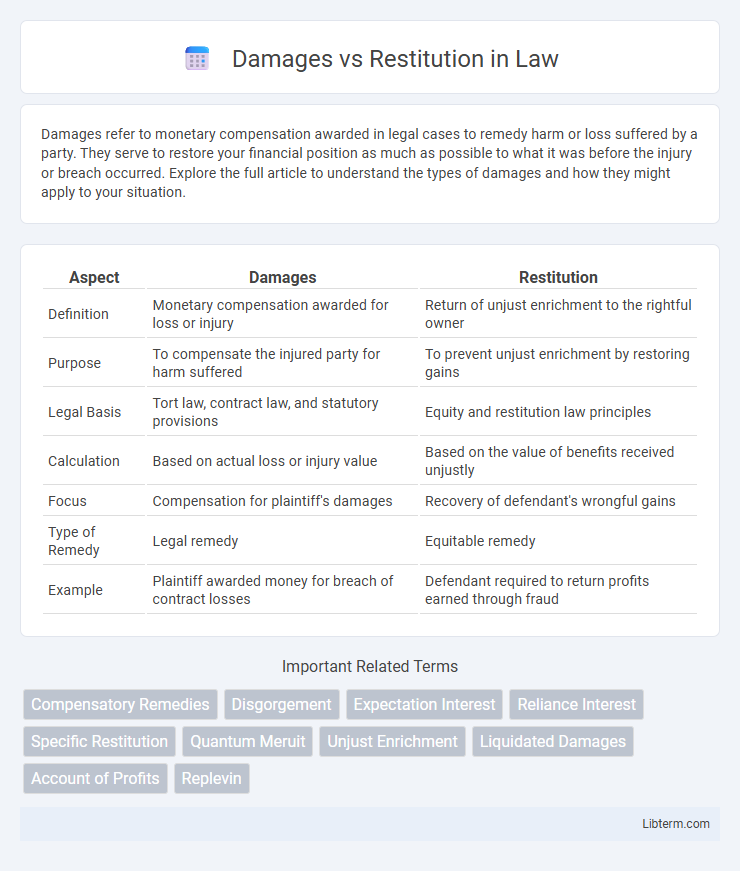Damages refer to monetary compensation awarded in legal cases to remedy harm or loss suffered by a party. They serve to restore your financial position as much as possible to what it was before the injury or breach occurred. Explore the full article to understand the types of damages and how they might apply to your situation.
Table of Comparison
| Aspect | Damages | Restitution |
|---|---|---|
| Definition | Monetary compensation awarded for loss or injury | Return of unjust enrichment to the rightful owner |
| Purpose | To compensate the injured party for harm suffered | To prevent unjust enrichment by restoring gains |
| Legal Basis | Tort law, contract law, and statutory provisions | Equity and restitution law principles |
| Calculation | Based on actual loss or injury value | Based on the value of benefits received unjustly |
| Focus | Compensation for plaintiff's damages | Recovery of defendant's wrongful gains |
| Type of Remedy | Legal remedy | Equitable remedy |
| Example | Plaintiff awarded money for breach of contract losses | Defendant required to return profits earned through fraud |
Introduction to Damages and Restitution
Damages refer to monetary compensation awarded to a plaintiff for losses suffered due to the defendant's breach of contract or tortious conduct. Restitution aims to restore the injured party to the position they were in before the wrong occurred, typically by requiring the defendant to return unjust gains. Both remedies serve distinct purposes: damages compensate for harm, while restitution prevents unjust enrichment.
Defining Damages: Key Concepts
Damages represent monetary compensation awarded to a plaintiff for losses resulting from a defendant's wrongful act, aiming to restore the injured party to their original position. Key concepts include compensatory damages, which cover actual losses such as medical expenses and lost wages, and punitive damages, intended to punish malicious conduct and deter future wrongdoing. Legal principles emphasize causation, foreseeability, and the quantification of harm to establish entitlement and the appropriate amount of damages.
Understanding Restitution: An Overview
Restitution aims to restore a party to their original position by requiring the return of unjust enrichment or benefits improperly obtained. Unlike damages, which compensate for loss or injury with monetary awards, restitution focuses on preventing unjust enrichment through the recovery of specific assets or funds. This equitable remedy is often applied in contract disputes, fraud cases, and property law to ensure fairness by undoing wrongful gains.
Legal Foundations: Damages vs. Restitution
Damages are monetary compensations awarded to a plaintiff to cover losses caused by the defendant's breach of contract or wrongful act, grounded in tort or contract law principles aiming to restore the injured party's expected position. Restitution, rooted in equitable principles, seeks to prevent unjust enrichment by requiring the defendant to return benefits wrongfully obtained, regardless of actual harm to the plaintiff. While damages focus on compensating loss, restitution focuses on disgorging gains, each reflecting distinct legal foundations and remedies within civil law.
Types of Damages in Civil Litigation
Types of damages in civil litigation include compensatory damages, which aim to reimburse the plaintiff for actual losses such as medical expenses and property damage. Punitive damages are awarded to punish the defendant for egregious conduct and deter future wrongdoing. Nominal damages recognize a legal wrong without substantial loss, while liquidated damages are predetermined amounts specified in contracts.
Forms and Principles of Restitution
Restitution involves the return or restoration of benefits unjustly received, emphasizing the principle of preventing unjust enrichment rather than compensating for loss, which distinguishes it from damages meant to cover actual harm or injury. Forms of restitution include the return of specific property, monetary reimbursement reflecting the value of benefits conferred, and disgorgement of profits gained unfairly. The principle underlying restitution prioritizes equity by restoring parties to their original position before the unjust enrichment occurred, ensuring fairness without assessing fault or harm.
Key Differences Between Damages and Restitution
Damages refer to monetary compensation awarded to a party for loss or injury suffered due to another's breach of contract or wrongful act, aimed at restoring the injured party to the position they would have been in if the breach had not occurred. Restitution, on the other hand, focuses on preventing unjust enrichment by requiring the party who benefited from the breach to return the value or benefit obtained. Key differences include that damages compensate for loss, while restitution seeks to recover gains wrongfully acquired, with damages calculated based on harm, and restitution based on the value of benefits conferred.
When Are Damages Awarded?
Damages are awarded when a party suffers a quantifiable loss due to breach of contract, tort, or other wrongful acts, aiming to compensate for financial harm or injury. Courts assess the extent of actual harm, including economic losses, emotional distress, or loss of property, to determine the appropriate monetary amount. Restitution, by contrast, focuses on returning the injured party to their original position by recovering unjust enrichment rather than on compensating for loss.
Circumstances Favoring Restitution
Circumstances favoring restitution arise when a party seeks to recover the value of benefits unjustly conferred, rather than compensatory damages for losses. Restitution is favored in cases involving breach of contract, mistake, or unjust enrichment where quantifying actual damages is difficult. Courts prioritize restitution to prevent one party from retaining an unfair advantage at the expense of another.
Practical Implications: Choosing Between Damages and Restitution
Selecting between damages and restitution hinges on the nature of the harm and the desired remedy. Damages aim to compensate the injured party by quantifying monetary loss, suitable for breach of contract or personal injury cases. Restitution focuses on restoring the plaintiff to their original position by returning unjust enrichment, often applied when one party benefits unfairly at another's expense.
Damages Infographic

 libterm.com
libterm.com